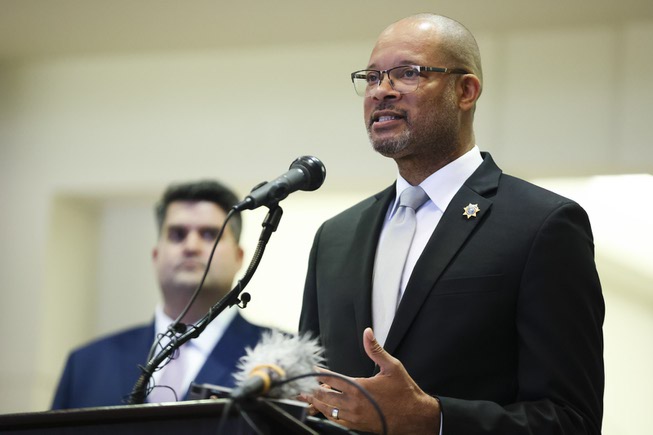
Nevada Attorney General Aaron Ford, foreground, speaks at the Grant Sawyer State Office Building Tuesday, Dec. 12, 2023. Pictured with Ford is special prosecutor Matthew Rashbrook.
Tuesday, Dec. 12, 2023 | 5:30 p.m.
Nevada Attorney General Aaron Ford today praised his office’s work to secure the criminal indictments of six Republicans who represented themselves as “alternative” electors for former President Donald Trump after his 2020 electoral loss to Joe Biden.
In a news conference at the Grant Sawyer State Office Building in downtown Las Vegas, Ford made his first public comments related to the fake elector scheme since his office announced the indictments Wednesday. The six defendants are scheduled to be arraigned at 9:30 a.m. Monday in Clark County District Court, according to online court documents.
“These charges are the culmination of a long and careful investigation into these actions taken in the aftermath of the 2020 election,” Ford said Tuesday. “We’ve been conducting this investigation for years to gather as many facts and as much evidence necessary to pursue justice.”
The six individuals are Nevada Republican Party Chairman Michael McDonald; James DeGraffenreid, one of Nevada’s representatives to the Republican National Committee and a district-level delegate to the 2016 Republican National Convention; Durward James Hindle III, vice chair of the Nevada Republican Committee; Jesse Law, chairman of the Clark County Republican Party; Shawn Meehan, founder of Guard the Constitution Project; and Eileen Rice, a longtime member of the Nevada Republican Party and delegate to the GOP national convention.
They were indicted by a Clark County grand jury on charges of offering a false instrument for filing and uttering a forged instrument, category C and D felonies, respectively, court documents show. The charges carry a maximum penalty of five years in prison.
An online version of the case file did not yet list attorney information for any of the six defendants.
Even though the faux ceremony took place nearly three years ago to the day, Ford defended the length of time it took for his office to bring forward the indictments. The statute of limitations on crimes of theft, robbery, forgery, burglary and arson have a four-year window to be prosecuted, according to state law.
“I don’t feel compelled to justify the length of my investigation,” Ford said. “My prosecutors and my investigators have worked diligently to ensure that we have facts and evidence to support every element of the crimes we’re prosecuting.”
Ford added the investigation remained ongoing and therefore could not comment on certain aspects of the probe. That includes when his office opened the investigation, though the Democrat noted his team had been looking into the matter for months when he testified in May in support of a bill that sought to criminalize fake elector schemes in Nevada.
Because of the sensitive political nature of the indictment, Ford called the probe a “damned if you do, damned if I don’t” scenario.
“Move quickly and this office will be accused of rushing to judgment for political purposes,” Ford said. “Take your time to secure sufficient facts and evidence to prove each and every element of a crime beyond a reasonable doubt, and be accused of delaying for political purposes.”
The indictment asserts the group was led by McDonald and met Dec. 14, 2020, in Carson City to conduct a phony ceremony to certify electoral votes for Trump.
The Nevada Republican Party sent the document — titled Certificate of the Votes of the 2020 Electors from Nevada — to the National Archives in Washington, D.C., with McDonald’s name listed on the return address.
Republicans in a handful of other states went through a similar process.
The meeting of fake electors — here and in the other five contested states — had no legal standing.
Nevada’s actual electors had already certified the state’s election results the same day in a remote ceremony, awarding all six of Nevada’s electoral votes to Biden.
Ford told the Nevada Legislature in May that his office spent months investigating the scheme but that he was unable to bring charges because no state law existed to make such an act illegal.
His testimony was part of a presentation on Senate Bill 133, which sought to establish criminal penalties for anyone taking part in “creating a false slate of electors, serving in a false slate of presidential electors or conspiring to create or serve in a false slate of presidential electors.”
The bill cleared the Democrat-controlled Legislature but was vetoed by Republican Gov. Joe Lombardo.
But Ford on Tuesday emphasized he was selective in his language to the Legislature to leave open the possibilty that his office could be investigating the group for violating other laws.
“I stated that no statute ‘directly addressed the issue,’ (and) that’s precisely what I meant,” Ford said. “That was true then, and it remains true now. But having seen the conduct of these individuals, I thought, and I still think, it would serve the public interest to have a statute that specifically and directly criminalizes these actions.”
In Michigan, Attorney General Dana Nessel, a Democrat, in July announced 16 fake electors would face eight criminal charges, including forgery and conspiracy to commit election forgery. The charges come with a maximum penalty of 14 years in prison.
Electors in Georgia are also facing charges. An investigation is ongoing in Arizona.
Efforts from attorneys general in other states had no bearing on the timeframe or charges brought against the defendants in the Nevada case, Ford said.
“We’re on no one else’s timeframe, and we’re not comparing our case to any other state,” Ford said. “We’re comparing our case to state statutes and evidence that we have, and we’re confident in an indictment, and we’re going to be confident in our prosecution.”
